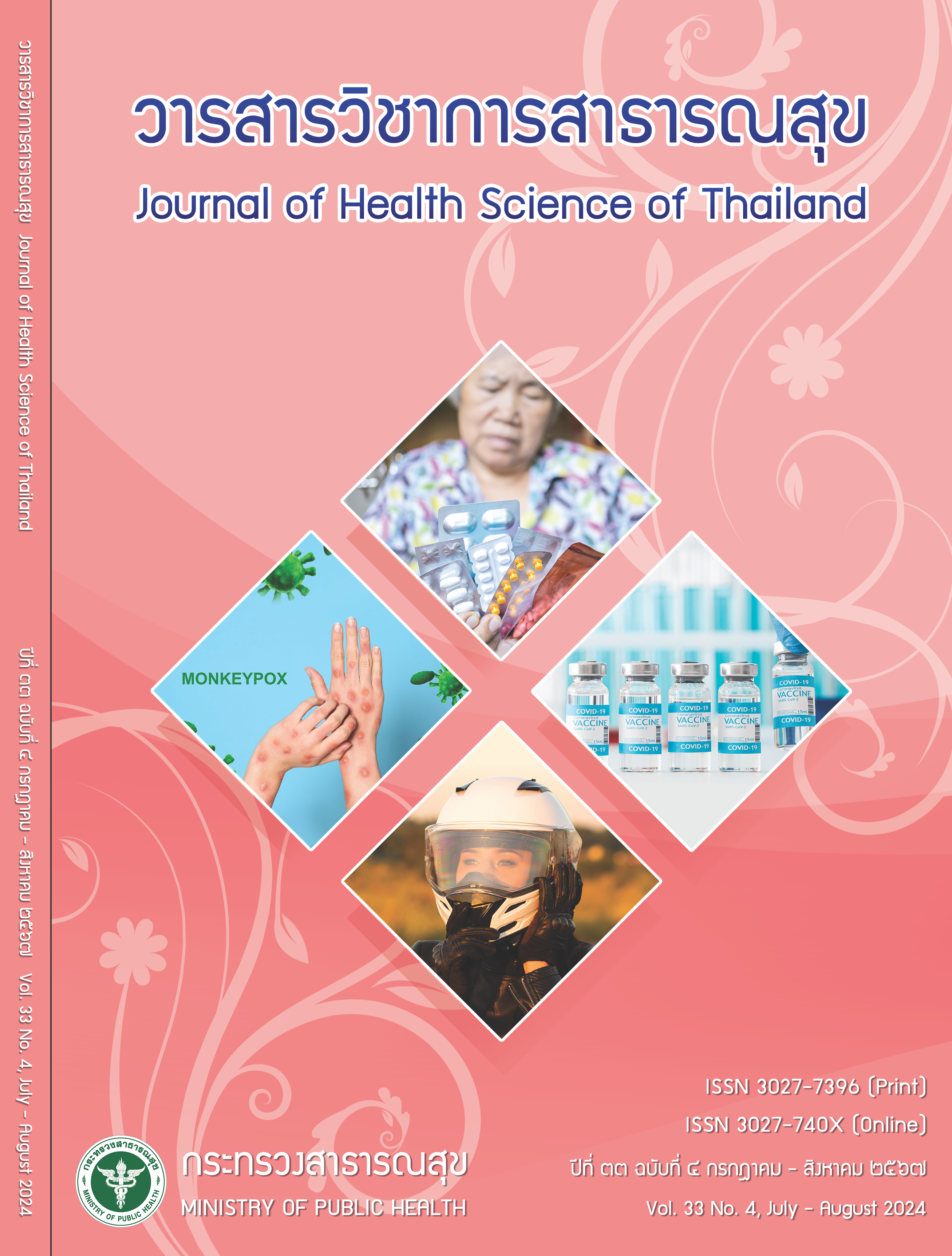Clinical Prediction Score for Progression to Severe Coronavirus Disease 2019 in Surin Province
Keywords:
COVID-19, risk factors, severe disease, pneumonia, prediction scoreAbstract
Thailand has been reporting COVID-19 infections since January 2020, with an increase in the number of cases during the Delta variant wave in April 2021. Due to limited availability of favipiravir, an antiviral medication used to treat COVID-19, it is essential to have a process selected by regional healthcare experts to allocate the medication appropriately. This study aimed to explore factors related to severe illness of COVID-19 in the Thai population during the outbreak of the Delta strain and used the information to consider treatment. A cross sectional study design was conducted, collecting data from patients aged 15 years and above who received treatment at a hospital in Surin province between April and August 2021. Basic demographic data, laboratory tests, chest X-rays, and treatment outcomes were recorded. The patients were divided into two groups: progress to severe and non-severe cases. Multivariable logistic regression analysis was performed to identify significant factors, and a scoring tool was created using the stepwise method. The results showed a total of 875 patients were included in the study, with 197 classified as severe cases and 678 as non-severe cases. Among the non-severe cases, 201 patients (29.7%) were asymptomatic, and 477 patients (70.3%) had mild symptoms. The study found that 344 patients (50.7%) were male, with a mean age of 35±12.6 years. At least one comorbidity or risk factor was present in 51 patients (7.6%). The mean body mass index was 23.7±4.6 kg/m², the median lymphocyte count was 1,846.4 cells/mm³ (IQR 1,409.7-2,353.2), and the median cycle threshold (CT) value was 23.5 (IQR 19.3-28.4). A total of 89 patients (13.1%) progressed to severe disease requiring antiviral medication. The multivariable logistic regression analysis revealed that the risk factors associated with disease progression to severe included age over 40 years (odds ratio [OR] 2.56), body mass index over 30 kg/m² (OR 3.34), and average CT value less than 20 (OR 2.57). These factors were statistically significant (p<0.05). When converted into scores, a score of 3 or higher was associated with a 12% higher risk of disease progression to severe, or 2 times higher compared to the general population. Scores of 3.5 or higher were associated with a 15% higher risk, or 3 times higher compared to the general population. The scoring tool had a predictive power of 70.1% according to the receiver operating characteristic (ROC) curve. It could be concluded that the COVID-19 patients with risk factors such as age over 40 years, body mass index over 30 kg/m², at least one comorbidity or risk factor, and average CT value less than 20 should receive antiviral medication to prevent disease progression to severe. Close monitoring and appropriate care should be provided
Downloads
References
Marin BG, Aghagoli G, Lavine K, Yang L, Siff EJ, Chiang SS, et al. Predictors of COVID‐19 severity: a literature review. Medical Virology [Internet]. 2021 [cited 2023 May 10]. Available from: http://dx.doi.org/10.1002/rmv.2146
Team CC 19 R, CDC COVID-19 Response Team, Bialek S, Boundy E, Bowen V, Chow N, et al. Severe outcomes among patients with coronavirus disease 2019 (COVID-19) - United States, February 12 – March 16, 2020. Morbidity and Mortality Weekly Report [Internet]. 2020 [cited 2023 May 10];69:343–6. Available from: http://dx.doi.org/10.15585/mmwr. mm6912e2
Grasselli G, Zangrillo A, Zanella A, Antonelli M, Cabri¬ni L, Castelli A, et al. Baseline characteristics and out¬comes of 1591 patients infected with SARS-CoV-2 admitted to ICUs of the Lombardy Region, Italy. JAMA 2020;323 (16):1574–81.
Palaiodimos L, Kokkinidis DG, Li W, Karamanis D, Ognibene J, Arora S, et al. Severe obesity, increasing age and male sex are independently associated with worse in-hospital outcomes, and higher in-hospital mortality, in a cohort of patients with COVID-19 in the Bronx, New York. Metabolism 2020;108:154262.
Zhou F, Yu T, Du R, Fan G, Liu Y, Liu Z, et al. Clinical course and risk factors for mortality of adult inpatients with COVID-19 in Wuhan, China: a retro¬spective cohort study. Lancet [Internet].2020[cited 2023 May 10];395(10229):1054–62. Available from:http://dx.doi.org/10.1016/s0140-6736(20)30566- 3
Xie J, Covassin N, Fan Z, Singh P, Gao W, Li G, et al. Association between hypoxemia and mortality in patients with COVID-19. Mayo Clin Proc 2020;95(6):1138– 47.
Wang D, Hu B, Hu C, Zhu F, Liu X, Zhang J, et al. Clinical characteristics of 138 hospitalized patients with 2019 novel coronavirus–infected pneumonia in Wuhan, China. JAMA [Internet]. 2020 [cited 2023 May 10];323 (11):1061-9. Available from: http://dx.doi.org/10.1001/jama.2020.1585
Tan L, Wang Q, Zhang D, Ding J, Huang Q, Tang YQ, et al. Correction: Lymphopenia predicts disease severity of COVID-19: a descriptive and predictive study. Sig¬nal Transduct Target Ther 2020; 5(1):61.
Zhang Y, Xiao LS, Li P, Zhu H, Hu C, Zhang WF, et al. Clinical characteristics of patients withprogressive and non-progressive coronavirus disease 2019: evidence from 365 hospitalised patients in Honghu and Nanchang, China. Front Med [Internet]. 2020 [cited 2023 May 10]. Available from: https://www.frontiersin.org/arti¬cles/10.3389/fmed.2020.556818/full
Ageno W, Cogliati C, Perego M, Girelli D, Crisafulli E, Pizzolo F, et al. Clinical risk scores for the early predic¬tion of severe outcomes in patients hospitalized for COVID-19. Internal and Emergency Medicine [Internet]. 2021[cited 2023 May 10];16(4):989-96. Available from: http://dx.doi.org/10.1007/s11739-020- 02617-4
Shang Y, Liu T, Wei Y, Li J, Shao L, Liu M, et al. Scoring systems for predicting mortality for severe patients with COVID-19. EClinicalMedicine [Internet]. [cited 2023 May 10];24:100426. Available from: http:// dx.doi.org/10.2139/ssrn.3582752
Zhou J, Lee S, Wang X, Li Y, Wu WKK, Liu T, et al. Development of a multivariable prediction model for severe COVID-19 disease: a population-based study from Hong Kong. NPJ Digit Med 2021;4 (1) :66.
Marumo A, Okabe H, Sugihara H, Aoyama J, Kato Y, Arai K, et al. Clinical characteristics and risk prediction score in patients with mild-to-moderate coronavirus disease 2019 in Japan. Cureus 2022;14(11):e31210.
Downloads
Published
How to Cite
Issue
Section
License
Copyright (c) 2024 Ministry of Public Health

This work is licensed under a Creative Commons Attribution-NonCommercial-NoDerivatives 4.0 International License.







